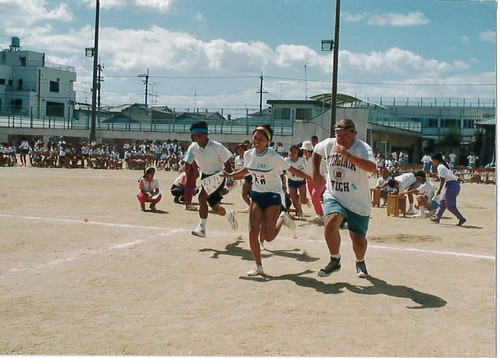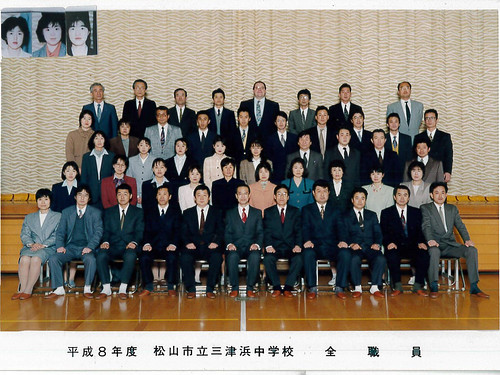What’s your name, when and where was your placement, and where are you from originally?
I am Stefan Hall. I was placed in Matsuyama-shi, Ehime-ken, from 1995-96. At the time of placement I was living in Virginia.
How did you find out about JET, and what led you to apply?
I first found out about JET from an ad in the Collegiate Times, the student newspaper of Virginia Tech, where I was an undergrad and finishing up a degree in English. So I figured I might as well apply as I had a long-standing interest in Japan that began way back in 5th grade when we studied Japan, it’s history, culture, and food as part of a sort of globalization unit. I remember trying nori for the first time and when we went on a field trip to Washington, DC to see a bunraku performance that made a really strong impression! Later on, while in Governor’s School for a summer, half the day was devoted to one subject (mine was biology) and the other half, for all students, was Japan. Not just history and culture but language instruction as well, so this is where I began to study hiragana, katakana, and kanji. I’m pretty sure this is where I saw my first Kurosawa film, and later at Virginia Tech I would take a film course in Kurosawa. I guess all along my interest in Japan was renewed over the years. I even asked my parents for a katana one Christmas and also took a kendo class one semester.
Unfortunately, I did not get into JET the first time, so after graduation I got a teaching job for a year, then decided to go back to graduate school at Virginia Tech and started working on a MA in English. After a year I saw another ad for JET and decided to try again. This time I got an interview – I think my teaching experience and just a few more years of life experience made all the difference – and ultimately was selected. So my advice to folks who really want to go and don’t get in on the first attempt to is build your skills and reapply. Ganbatte!
What did you hope to achieve on JET, and did that change during your time here?
I think for me I had always wanted to travel and see the world, and going to Japan seemed like a great first (and maybe very big) step. Being assigned to Matsuyama meant living in a city for the first time in my life, so that was an interesting layer to the experience. Perhaps an unforeseen bonus was all the other foreign teachers I worked with in the program, not just the great faculty at my Japanese schools but also fellow JET members from the US, England, Canada, New Zealand, and all over the world. It really opened up a lot of doors for me. Right after leaving the program I went to the UK for the first time and saw England, Wales, and Scotland. Then two years later I was off to Spain, and I’ve just kept traveling as I get opportunities. I believe that JET made me more open to international experiences and networking with people from other countries.
What is your lasting impression of the work you did on JET and the communities you were part of?
I think one of the most important things about being an Assistant Language Teacher (ALT) on JET was being a cultural ambassador. Many Japanese got to know me not just as Hall-sensei from America but as a real person with lots of interests and different ways of doing things, a thinking and feeling human, and we could all connect on that level. I had a great kocho-sensei at my base Junior High School – he taught himself English from watching movies! I’ve got great stories about him – and he actually trusted me enough to go into the classroom by myself on occasion if there was a teacher shortage that day. Plus I got to go into other subjects (geography, math) and help teach those. I had a great boss and partner, Kusumoto-sensei, at the local education office, and he really cared for all the JET members like they were part of his family in a way. The Japanese take hospitality very seriously and will really go to great lengths in that regard, but I think they also want (like all of us really) to be understood on a human level. I’d like to think I inspired some of my students to think critically and creatively not just about their education but also about their lives, and go out and explore.
Where did JET lead you?
Well, I left JET after just one year because I felt like I really had to return and finish my interrupted MA. If that degree was done I probably would have stayed for at least another year. Anyhow, my experience in Japan led me to start watching more anime, being more aware of Japanese video game production, being on the lookout for any Japanese restaurant in America that would make okonomiyaki for me (a personal favorite, and Japanese food is more than just sushi!), and ultimately as an academic I started teaching some Japanese films in class. I wound up writing about them, doing book reviews of scholarly texts about Japanese pop culture, and a number of conference presentations on the topic, too. I actually was going to return to Japan for a cinema conference in Tokyo in 2009, but it was canceled due to the H1N1 outbreak.
Perhaps the biggest accomplishment that I am most proud of is when I started my current position at High Point University, during the first day of orientation the Provost was talking about these Maymester, short-term, faculty-led study abroad opportunities. He put up the list and immediately I noticed a glaring omission: Japan. I had to wait one year as a new faculty member before proposing the course, but I created a class in Japanese Media & Popular Culture that ends with a two-week trip to Tokyo. The students get to experience everything we’ve been studying in person. From Akihabara to sumo matches to a day trip to Kamakura, we cram a lot in, including Shinjuku’s Robot Restaurant, a taiko workshop, learning to make soba, and yes, eating okonomiyaki! In the five times thus far that I have taught the course I have been so fortunate to expose 115 students to the life-changing experience that is going to Japan. I really look forward to the resolution of the pandemic as we have not been able to offer the class due to travel restrictions. (And we are switching locations to Osaka, so that is an exciting change, too.) In two years the plan is to scale up the class to be an immersive four week experience in Japan where the students will take a class with myself and another professor to get an even better exposure to Japan.
I should also add I have students who occasionally apply to JET because of their experience in my class, and this year I’ve got a young man who I think is a strong candidate, so I am really pulling for him. If I, as a former JET member, can help another person get into JET by telling inspirational stories and writing a good recommendation, I think I am honoring not only my experience but everyone who helped me when I was in Japan.
Right now, some incoming JETs have been delayed by more than a year, and are in the difficult position of choosing to indefinitely wait for Japan to open up or to give up on coming here. Do you have any comments or advice for them during this time?
First, take this time to practice your Japanese language skills! That will be very useful. Get involved with educational opportunities like volunteering with a local literacy program or tutoring students during the pandemic. Anything that will help you get some more experience teaching and working with people in that capacity. Keep up with news from Japan, not just things going on with the government and foreign policy but developments in popular culture, and do the same with developments in America. As a language teacher and cultural ambassador you are going to get asked a broad range of questions that maybe you haven’t thought much about in your daily life, everything from “What’s a participle? What’s a gerund?” to “What are the words of your national anthem? And would you sing it for us?” You are going to have a wild and wonderful time. Finally, do a bit of strategizing when it comes to your plans to stay in touch with friends and family back home. It’s a whole lot easier to do it now than when I went to Japan back in 1995, but having good communication with your loved ones will help make the transition to the very foreign, but very wonderful, land of Japan a great one for you.
If you had been in their position, do you think you would have gone on JET if you’d been in limbo for a year?
I can say with 100% certainty that I would have still gone if I would have been delayed. I would just have used the time to get even more prepared for departure. Seriously, if you have been accepted into JET, it’s because you really want to go to Japan, so why would you give up on that dream? It is totally worth it, and it will change your life.


















Leave a Reply